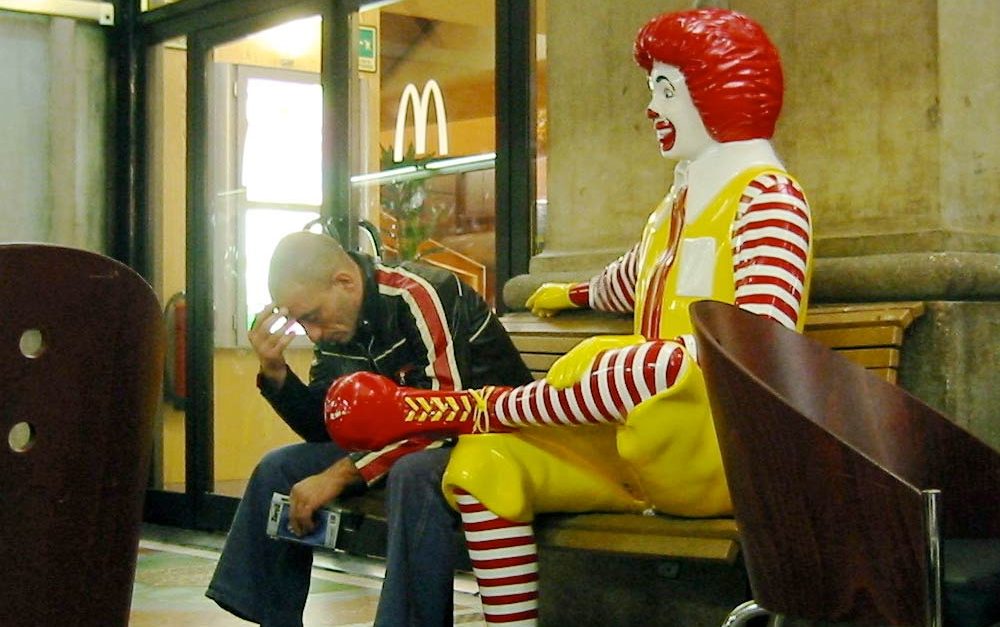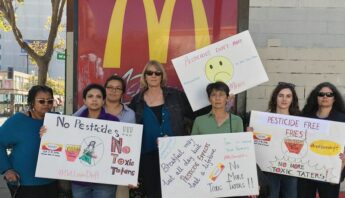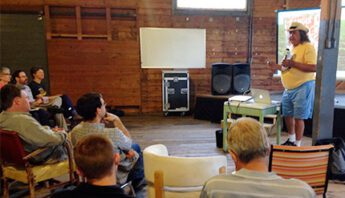It’s been a rough year for McDonald’s. Everyone — from the company’s top executives to mainstream press — agrees that the fast food giant is struggling. The company’s sales have fallen for the past six quarters, and other measures of company success — traffic, income, and net revenue — are all down as well. Steve Easterbrook, McDonald’s new CEO, said it himself: “We are not on our game.”
I’m no financial analyst. But as I read the headlines day after day about McDonald’s slump, it’s clear to me that the company has a few straightforward opportunities to start reshaping its brand. In short: McDonald’s should spend less time marketing itself as a socially responsible corporate actor, and more time making real changes to do business more responsibly. And as we’ve been saying in the Toxic Taters campaign, real action to protect communities from pesticides used to grow McDonald’s potatoes is one important place to start.
Time for a real turnaround
If McDonald’s is interested in a real turnaround plan, the company doesn’t have to look far for guidance. Organized communities demanding accountability have laid some clear demands at their door. And McDonald’s would do well to start listening.
For years, our friends at Corporate Accountability International have called on the fast food giant to stop marketing to kids. Fast food workers, organizing in their work places and connecting across the country through the Fight for 15 campaign, have insisted that they have the right to a living wage and a union; they’re calling for an end to the fast food status quo of high corporate profits and low wages.
And then there’s the pesticide problem. McDonald’s potatoes are grown using hazardous pesticides that can cause health problems for people who live near potato fields. These communities, fed up with being exposed to harmful chemicals, have gotten organized and formed the Toxic Taters Coalition. And since 2006, PAN has been working with people near the potato fields to stop pesticide drift.
Most potatoes in Minnesota are grown by RD Offutt Company (RDO), the largest potato producer in the world, and a major potato supplier for McDonald’s french fries. Back in 2009, McDonald’s was eager to make a public promise to reduce pesticide use on its potatoes, but six years later, communities near potato fields haven’t seen much change.
Pesticides commonly used to grow potatoes include endocrine disruptors, carcinogens and developmental toxicants. At the height of the growing season, Native and rural communities in northern Minnesota are exposed to these pesticides at worrisome rates. Pesticides are applied to potato fields every 5-7 days, and between applications, they can volatilize and travel through the air for days. These communities deserve pesticide-free air to breathe, and McDonald’s has a chance to be part of the solution.
Do the right thing
Even with a tarnished public image, McDonald’s still has sway over the market — and can influence growers it relies on (like RDO) to shift farming practices. Instead of launching questionable marketing campaigns, McDonald’s has a chance to do the right thing on many fronts — pay higher wages, support unions in the workplace, stop marketing to kids and insist on non-toxic ‘taters for its fries. The company’s other option? Dig in its heels and brace for our campaigns to continue — and see its marketshare keep slipping.
And continue we will. This fall, PAN and our partners in the Toxic Taters Coalition are planning a national day of action. Campaign supporters around the country will visit local McDonald’s stores and deliver the message loud and clear: no more Toxic Taters! If you’d like to be involved, please get in touch. It’s going to take all of us, standing alongside communities near the potato fields, to move McDonald’s — and to start building the food and farming system we want to see.
Photo: davide vizzini | Flickr








